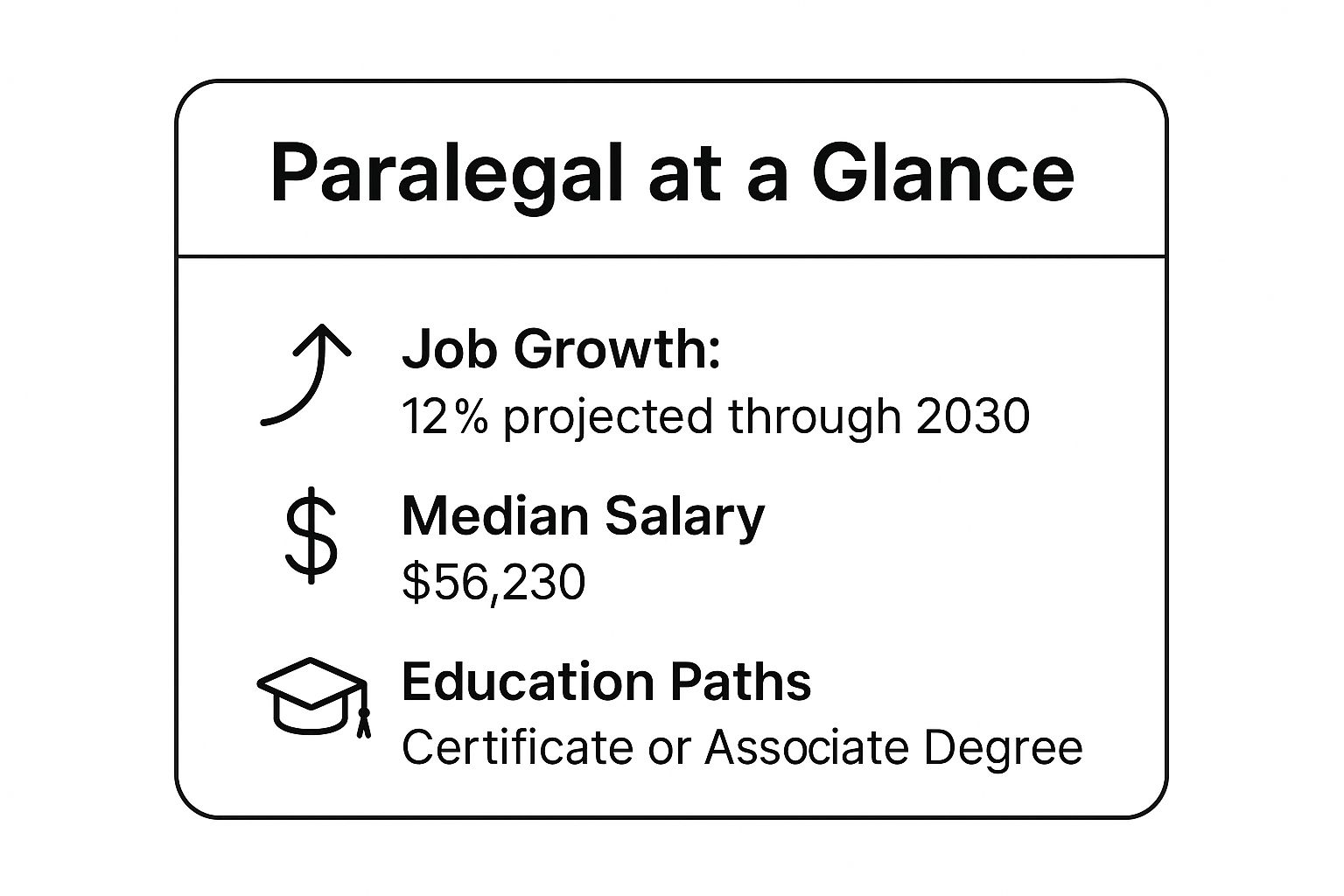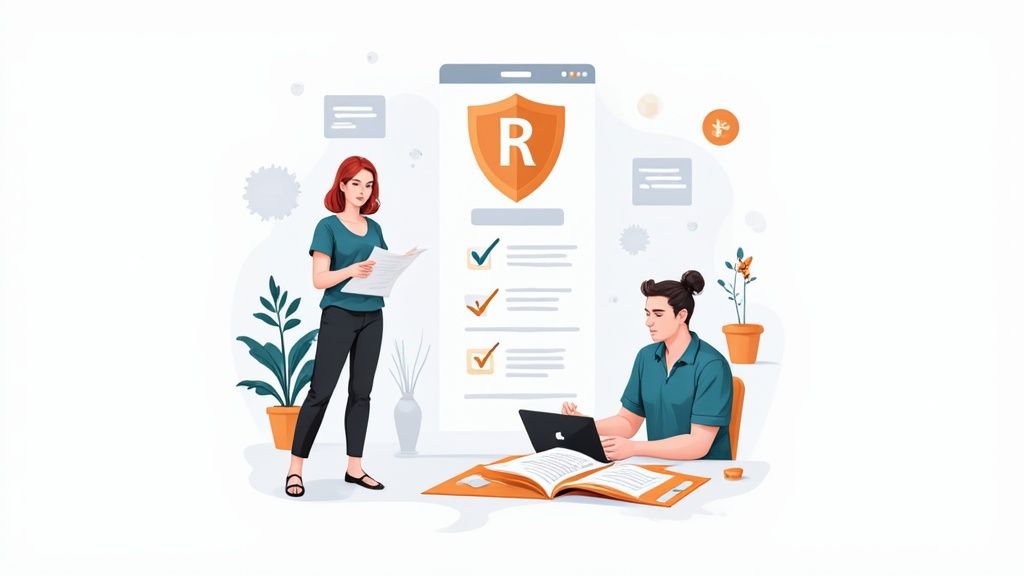
 16 minutes read
16 minutes read
Let's be honest. The legal world looks like an exclusive club, accessible only to those with a Juris Doctor degree and the mountain of debt that comes with it. But what if you could bypass the J.D. entirely and still build a killer career in law? Turns out, you don't need to spend three years buried in casebooks to make a real impact—or a great living.
This isn't some fluffy list of vague possibilities. I'm handing you the keys to the kingdom. We’re diving into the specific, high-value legal careers without a law degree that firms, corporate departments, and government agencies are desperate to fill right now. Think of this as your battle-tested roadmap, detailing the exact skills you need, the salaries you can command, and the no-BS steps to take to land these roles.
We’ll cover everything from the indispensable paralegal—the true backbone of any legal team—to the tech-savvy compliance officer who keeps businesses from lighting money on fire. Forget the theory. This guide is for people who are ready to get to work. Let’s get into how you can leverage your actual talents to break into the legal field without ever stepping foot in a law school classroom.
If the legal world is a high-stakes chess match, the paralegal is the queen. They're not the king (that's the attorney), but they are absolutely the most powerful and versatile piece on the board, executing the critical moves that win the game. This role is one of the most respected legal careers without a law degree, and for good reason: it’s a direct path to doing real, substantive legal work.
Paralegals are the operational engine of any legal team. They handle everything from drafting legal documents and digging through case law to organizing mountains of evidence and being the client's main point of contact. They do the heavy lifting that allows attorneys to focus on high-level strategy and courtroom theatrics. You'll find them everywhere, from corporate paralegals navigating messy M&A deals to immigration paralegals meticulously preparing visa applications that literally change lives.
Here's the good news: breaking into this field doesn't require mortgaging your future on a three-year J.D. The most common entry points are an associate degree in paralegal studies or a post-baccalaureate certificate. These programs, especially the ones approved by the American Bar Association (ABA), give you the foundation you need to be useful from day one.

Key Insight: Specialization is your superpower. Don't just be a paralegal; be the litigation paralegal who knows e-discovery software inside and out, or the corporate paralegal who can manage a data room in their sleep. That’s how you become invaluable.
Here’s a quick snapshot of the paralegal profession, visualizing some key data points.

As the data shows, the field is growing, offering a stable and rewarding career. To really kill it, focus on building strong tech skills in legal software and cultivating relationships with attorneys. A good paralegal isn't an assistant; they're a trusted partner. If you're ready to dive deeper, you can learn more about paralegal certification requirements on hireparalegals.com.
If the legal world is a finely tuned orchestra, the legal assistant is the conductor. They don’t play an instrument, but they make damn sure every section plays in harmony, from scheduling court dates to managing the flood of client emails. This role is a cornerstone among legal careers without a law degree, serving as the organizational hub that keeps a law practice from imploding.
Legal assistants are the masters of logistics. They are the gatekeepers of an attorney’s calendar, the preparers of critical letters, and the meticulous organizers of files. While a paralegal might be researching case law, a legal assistant is ensuring the resulting motion is filed correctly and on time—a small detail that can tank an entire case if missed. You'll see them as family law assistants managing sensitive client intake or as corporate legal assistants maintaining vast contract databases with military precision.
The best part? You don't need a fancy degree to get started. Many successful legal assistants start with a high school diploma and killer administrative skills. But let's be real: a certificate or associate degree in legal administration will give you a serious edge by teaching you the lingo, software, and court procedures you need to know.

Key Insight: Your value isn't in being organized; it's in being psychic. A great legal assistant doesn't just schedule a deposition. They book the conference room, arrange for the court reporter, and have all the exhibits printed and ready before the attorney even knows they need them.
That’s what turns you from an administrative helper into an indispensable partner. You manage the chaos so the lawyers can focus on lawyering. Before your next big interview, get your head in the game; you can get ready by studying key legal assistant interview questions on hireparalegals.com.
If the legal world is a stage, the court reporter is the silent, indispensable director capturing every single word of the performance. They are the guardians of the official record, ensuring every syllable uttered in a deposition, hearing, or trial is preserved with flawless accuracy. This is a perfect example of a high-stakes legal career without a law degree, blending insane technical skill with the pressure of real-time legal drama.
Court reporters create the verbatim transcripts that the entire legal process is built on. Using a specialized stenotype machine, they translate spoken dialogue into a written record at speeds over 225 words per minute. It’s bananas. Their work is critical for attorneys prepping for trial, for judges reviewing testimony, and for the whole appeals process. You’ll find them not just in courtrooms but also providing broadcast captioning for TV or CART services for the hearing-impaired.

Forget law school. The path here runs through specialized training programs that hone your speed, accuracy, and understanding of legal jargon. Most aspiring reporters complete a two-to-four-year certificate or associate degree program. After that, certification is everything. Nailing a designation like the Registered Professional Reporter (RPR) from the NCRA is the gold standard that proves you’ve got the goods.

Key Insight: This isn't just a job; it's a high-performance skill, like being a concert pianist. Your speed and accuracy are your currency. The top earners are the ones who never stop practicing, carving out lucrative niches in complex litigation like medical malpractice or patent law where every word is worth a fortune.
The demand for skilled reporters is high because, frankly, it’s incredibly hard to do. For those with the discipline, it’s a challenging and seriously rewarding career. If this sounds like your kind of crazy, you can explore training programs and certifications on the NCRA website.
If attorneys are the architects of a case, legal investigators are the explorers who map the terrain and find the buried treasure. They are the fact-finders, the truth-seekers, and the boots on the ground who unearth the evidence that makes or breaks a case. This is one of the most dynamic legal careers without a law degree, perfect for anyone with a curious mind and a relentless drive for answers.
Legal investigators are the muscle behind an attorney's strategy. They interview witnesses, run exhaustive background checks, document accident scenes, and find the smoking-gun documents others miss. They mix old-school detective work with modern surveillance and cyber-sleuthing to build the factual foundation of a case. You'll find them piecing together timelines for a criminal defense or validating claims in a high-stakes insurance dispute.
You don't need a law degree to become a modern-day Sherlock Holmes, but you do need a specific skillset. Many investigators come from law enforcement, the military, or journalism. A degree in criminal justice helps, but practical certifications are what really open doors. Get familiar with your state’s private investigator licensing requirements, because most states regulate this gig.

Key Insight: Your network is your most powerful tool. A solid web of contacts in law enforcement, the legal community, and various public and private sectors gives you access to information no database can offer. In this game, trust and reputation are your currency.
The work is tough, but for the right person, it’s an adrenaline-fueled alternative to a desk job. A skilled investigator is an attorney's secret weapon, turning flimsy theories into solid proof. If you're ready to learn from the pros, check out the resources at the National Association of Legal Investigators (NALI).
If the business world is a complex highway system, the compliance officer is the GPS, the traffic controller, and the highway patrol all rolled into one. They aren't driving the car (the business), but they are making sure it stays on the right road and avoids expensive, company-killing collisions with the law. This role is a powerhouse among legal careers without a law degree, putting you at the critical intersection of business and regulation.
Compliance officers are the corporate guardians of integrity. Their job is to make sure the company plays by the rules—whether those rules come from the government, industry bodies, or their own internal policies. They build compliance programs, conduct risk assessments, train employees not to do dumb things, and investigate when someone inevitably does. You’ll find them in any highly regulated industry, from banking compliance officers fighting money laundering to healthcare compliance officers protecting patient data.

You don't need to pass the bar to be the person who keeps a multi-million dollar company out of legal hot water. The path usually starts with a bachelor's degree in business, finance, or a related field. From there, industry-specific experience is king. Many people pivot into compliance after working in auditing, risk management, or even as paralegals.

Key Insight: Certifications are your golden ticket. A degree gets you in the door, but certifications like the Certified Compliance & Ethics Professional (CCEP) prove you have specialized, in-demand expertise. They’re a shortcut to telling employers you speak fluent regulation.
A compliance career is about preventing fires, not just putting them out. To succeed, you need a sharp analytical mind, killer communication skills, and an ethical compass that doesn't waver. It’s a role with immense responsibility and rewards. If this sounds like your jam, organizations like the Society of Corporate Compliance and Ethics (SCCE) are a great place to start.
If attorneys are the architects, the Legal Technology Specialist is the master engineer who builds the high-tech scaffolding that makes the whole project possible. They are the bridge between old-school law and new-school tech, making this one of the most future-proof legal careers without a law degree. In a world drowning in data, their expertise isn't just helpful—it's non-negotiable.
Legal tech specialists are the wizards behind the curtain. They manage the complex software that keeps a modern law firm from collapsing under its own weight. They run the e-discovery platforms that sift through millions of documents and deploy the trial presentation tech that wows a jury. They are the litigation support gurus in big law firms or the solo tech authority in a corporate legal department, ensuring every digital process is efficient, secure, and compliant.
You don't need a law degree, but you do need a blend of tech chops and a real understanding of how a law firm actually works. Many start in IT or computer science, then specialize with certifications in legal-specific software like Relativity or Clio. A bachelor's degree is common, but I'll take someone with hands-on experience and the right certs over a fresh-faced grad any day.

Key Insight: Don't just be a tech person who happens to work in a law firm. Become a legal professional who speaks tech fluently. Understanding the why behind a legal process—like discovery—makes you exponentially more valuable than someone who just knows which buttons to click.
This role requires you to be a problem-solver, a project manager, and a teacher, often training lawyers on the very tools you implemented. Your success depends on translating complex tech into practical solutions that make lawyers' lives easier. If you're passionate about this stuff, find out how to work as a legal professional on hireparalegals.com.
If the legal industry is a talent-driven universe, the legal recruiter is the master navigator charting the stars. They are the ultimate connectors, the market-savvy insiders who pair brilliant legal minds with the firms that need them. This is one of the more dynamic and financially rewarding legal careers without a law degree, perfect for people who are good at sales, networking, and figuring out what makes people tick.
Legal recruiters are the architects of legal careers. They don't just shuffle resumes; they understand the nuances of different practice areas, the cultural DNA of a law firm, and the career goals of an in-house counsel. They're part talent scout, part career coach, and part dealmaker, placing everyone from a senior partner at a top-tier firm to a contract attorney for a last-minute project.
You don't need a J.D. to be a kingmaker, but you do need an entrepreneurial spirit and insane people skills. Many successful recruiters come from sales, HR, or even former paralegal roles. A bachelor's degree is the norm, but what really matters is your ability to build a network and close deals. The fastest way to learn is to get a job at a recruiting agency, even a junior one.

Key Insight: Your network is your net worth. The best recruiters don't just find candidates; they cultivate deep, long-term relationships. The associate you place today could be the hiring partner you work with in five years. Never, ever burn a bridge.
Success here hinges on specialization and relentless networking. Top firms like Major, Lindsey & Africa built empires by focusing on high-stakes partner placements. You have to become an expert in your niche. If you want to see how the pros do it, explore the world of legal recruiting at MLA's website.
| Role | Implementation Complexity | Resource Requirements | Expected Outcomes | Ideal Use Cases | Key Advantages |
|---|---|---|---|---|---|
| Paralegal | Moderate – requires legal training and certification | Certificate or associate degree; legal software skills | Support attorneys with research, drafting, case prep | Law firms, corporate legal departments | Meaningful legal work; strong job growth |
| Legal Assistant/Secretary | Low – primarily administrative tasks | High school diploma or some college | Efficient office management and document handling | Law offices needing admin support | Entry-level access; transferable skills |
| Court Reporter/Stenographer | High – specialized stenography training | Certificate or associate degree; stenography equipment | Accurate legal transcripts in real-time | Courtrooms, depositions, broadcast captioning | High earning potential; job security |
| Legal Investigator | Moderate – investigative skills and some training | High school diploma minimum; preferred degree | Gather evidence and factual case support | Criminal, personal injury, insurance investigations | Varied work; independent and flexible role |
| Compliance Officer | High – requires knowledge of regulations and policies | Bachelor's degree preferred; certifications | Ensure organizational adherence to laws | Finance, healthcare, corporate sectors | High demand; strong salary and career growth |
| Legal Technology Specialist | Moderate to high – tech + legal knowledge | Bachelor's degree in IT or related field | Manage legal tech systems and support teams | Law firms adopting digital tools | Growing field; blend of tech and legal skills |
| Legal Recruiter | Moderate – knowledge of legal market and recruiting | Bachelor's degree preferred; recruiting experience | Successful legal talent placement | Law firms, corporations, government agencies | High earning potential; flexible work |
So there you have it. The legal field isn't some ivory tower with a JD-required dress code. We’ve just walked through a lineup of vital, rewarding, and high-impact legal careers without a law degree. Each role is a distinct pathway into the heart of the justice system, proving that a passion for law isn't measured in student loan debt.
The common thread? These aren't just "jobs." They are careers built on specialized skills and an unwavering commitment to getting it right. Whether you're a Court Reporter capturing every critical word or a Compliance Officer navigating a regulatory maze, you are an essential gear in the machine. You're not just supporting lawyers; you're enabling justice.
Look, reading this article is the easy part. The real work starts now. Your next move isn't to boil the ocean. It's to take one, decisive step.
The idea that you need to spend a fortune and three years of your life to make a difference in the legal world is officially dead. The modern legal ecosystem thrives on a diverse range of professionals. These legal careers without a law degree aren't a "back door" into the industry; they are the essential infrastructure that holds the whole damn thing together. The opportunity is right there, waiting for you to claim it.
Ready to connect with top-tier paralegal talent or find your next remote role? At HireParalegals, we bridge the gap between skilled legal professionals and the firms that need them, making it simple to build or join an elite legal team. Explore your next opportunity at HireParalegals.